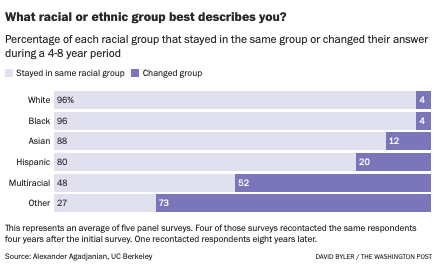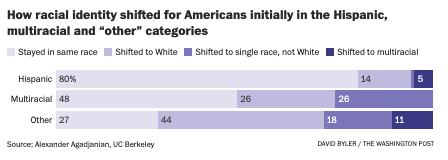Racial identity is more fluid than you might think
Many Americans assume race is a constant: something people are born into and that — like their birth date or country of origin — simply doesn’t change. But for a surprising number of us, race is a fluid concept. Polling data show that roughly 8 percent of adults jumped from one racial category to another in recent years. And that has important political implications for the Republican Party. The best data on race-switching comes from panel surveys conducted by academics. These studies — such as the General Social Survey, the American National Election Studies and the Cooperative Election Study — ask a representative sample of Americans about their views and identities and then contact them again four to eight years later to track how they have changed. On the most basic question of race — “What racial or ethnic group best describes you?” — many who initially identified as Hispanic, multiracial or “other” changed their answers in the second round.
And, in most cases, these switchers moved into the “White” category.
This data is personal to me. My maternal grandfather was Southeast Asian, and my other three grandparents were White. My mother, who is half-Indian, is adopted, so I don’t have much connection to Indian culture. But in my very White West Virginia hometown, my light brown skin stood out. People often asked, “Where are you really from?”
For example, 59 percent of multiracial Trump converts — that is, mixed-race voters who passed on Mitt Romney in 2012 but voted for Donald Trump in 2016 — also switched their race to White. Among multiracial voters who didn’t support Trump or Romney, only 4 percent moved into the White category.
More From The Washington Post (subscription required):












